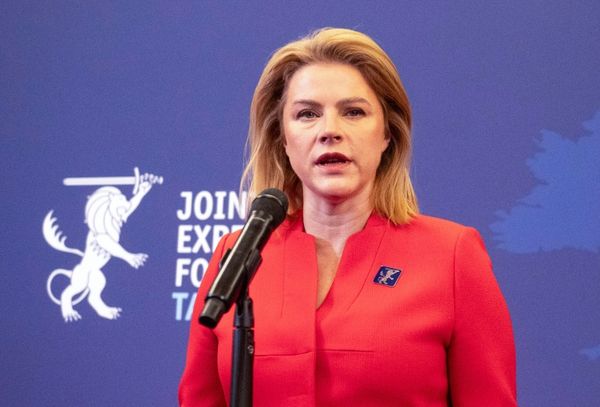
If you think Australia’s copycat culture war against the Voice to Parliament — with all its fake news and casual racism — is as bad as it gets, then just wait. It looks set to be just another step in the global right’s war on empathy.
It’s no longer enough to say “no” to social change. Now, the culture warriors on the right, here and abroad, are demanding something far more insidious: that we stop caring.
It’s already shaping the No campaign. The Uluru Statement from the Heart calls all Australians to “walk together” based on an empathetic understanding of the “torment of [First Nations’] powerlessness”, and the conservative right responds: “Nah, don’t wanna. Can’t make me.”
In the post-Trump US, or post-Brexit UK, we see clues in what to expect if the Liberal/News Corp No camp wins the Voice referendum in Australia — the weaponisation of a surprise political win into a rejection of the politics of empathy.
In the US, the “anti-woke” right is fighting empathy on two fronts: on one, they’re trying to pull it out by its roots, banning books that help us imagine lives other than our own and rewriting educational syllabuses to legitimate the violence of slavery.
On the other, in both the US and the UK, they’re fighting against “woke capitalism”, specifically targeting “DEI” — all those corporate and governmental programs promoting diversity, equity and inclusion.
Corporate diversity programs exploded as a response to what Americans call the “racial reckoning” — the 2020 protests against police killings of Black people. In the US, between June and August that year, demand for people to fill DEI roles grew 55%. But the war on woke is starting to bite. Last year, according to LinkedIn, “chief diversity officer” was the only senior management role to see recruitment decline.
Diversity programs have their flaws, but they recognise that someone should pay for what that popular anthropologist of the world of work, David Graeber, calls the “interpretive labour” involved in managing up across gender, culture and class — in understanding just WTF the usually white, male superiors want. (As Graeber acknowledges, feminists have been pointing this out for years.)
Traditionally, this work of cross-cultural interpretation is highly lopsided, almost all of it bottom-up rather than top-down. It’s usually unpaid and unacknowledged, as is much of the related concept of reconciliation work for Indigenous Australians, writes IndigenousX’s Luke Pearson.
Now by making the Voice a matter of a referendum, all of us are being asked to do some of the heavy lifting of that interpretive labour. The right is instead trading on a sullen truculence to defeat it. As our own political anthropologist of settler Australia, John Howard, bleated to fellow culture warrior Janet Albrechtsen in The Australian last week: “Why are we doing this to ourselves?”
It was a reminder that back when Howard was busy embedding the culture war into Australian politics, it was with a King Canute-style promise to stop the tide of social change largely with gesture politics — like outlawing same-sex marriage or refusing to apologise for the Stolen Generations.
Now that’s not enough, to win either elections or culture wars. As The New York Times’ Ezra Klein has noted, demographics lag politics. Almost 20 years on from Howard’s final electoral win, the constituency for his politics is diminished by a rising generation — more educated, more diverse, influenced by a more empathetic culture. The challenge is how to embed that culture in our civic identity.
Then-prime minister Paul Keating had a go with the 1992 Redfern Park speech in a call to imagine ourselves as others to launch the reconciliation project. Fifteen years later, then-prime minister Kevin Rudd had a go with the apology and embraced the Closing the Gap strategy.
The right has grasped the threat. Inspired by alt-right Breitbart founder Andrew Breitbart’s maxim that politics is downstream from culture, they have convinced themselves that they need to use politics to strip kindness and understanding — the joy of a diverse national identity — out of our countries’ cultures.
In his Platformer Substack last week, Casey Newton saw a similar imperative driving Elon Musk’s “cultural vandalism” of what we once called Twitter: the cruelty really is the point, as The Atlantic’s Adam Serwer noted at the height of Trump-mania in 2018.
It’s in that spirit that our local right — through both its political and media wings — are campaigning to refuse the offering of the Voice, confident that a successful No will empower it with a social license to continue its war against empathy.







